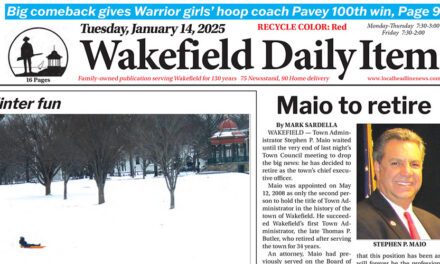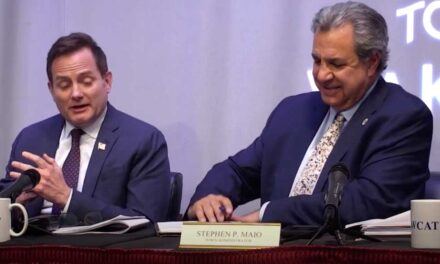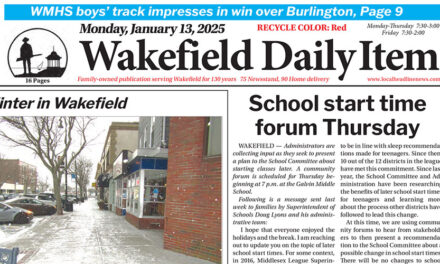Published in the March 3, 2020 edition.
WAKEFIELD — Recycling, as we know it, changed with China’s 2018 policy known as “National Sword.” National Sword reduced the acceptable contamination rate threshold to less than .05 percent, thereby characterizing the majority of US recycling exports as trash.
In order to combat recycling contamination and ensure that Wakefield’s recycling stream can be manufactured into new products, the Department of Public Works (DPW) and recycling hauler, JRM, are working together to decrease contamination at the curb. They are asking residents to take a “Back to Basics” approach to recycling.
Wakefield’s curbside recycling is single stream and occurs on alternating blue and red weeks. Recycling is unlimited, mandatory, and must follow these guidelines:
• Metal; plastic bottles, jars, jugs, and tubs; glass; and paper and cardboard are recyclable.
• Empty and rinse food and beverage containers and replace the caps, if applicable.
• Empty and flatten mixed paper (newspaper, magazines, and cardboard boxes).
• Do not place recycling items in plastic bags. You may use paper bags instead.
Some of the items that contaminate curbside recycling are recyclable through alternative means. These items include: plastic bags; metal items that are not containers; rigid plastic items; textiles; shredded paper; and tanglers like wires, chains, and electric cords. To learn how to recycle these items please visit the DPW’s refuse page at https://www.wakefield.ma.us/refuse.
The following items should be thrown in the trash: containers with food or liquid; coated paper cartons typically used for milk and orange juice; Styrofoam; pizza boxes with pizza in it or cheese stuck to it; and tanglers including hoses and ropes.
Effective March 1, 2020, JRM will be marking recycling bins containing recycling contamination and will check off which contaminants are present to help educate our residents. Contaminated bins will be left curbside and picked up on your following recycling day, as long as the recycling contamination has been removed. DPW will have staff in the field during this time to answer any questions you may have.
By working together, we can make Wakefield’s recycling stream cleaner and get more of our curbside recycling manufactured into new products. This is a win for the environment and economy. In addition, Wakefield will continue to offer ways to dispose of those hard-to-recycle items that can’t be recycled curbside. If you have any questions or concerns, please contact the Wakefield DPW at 781- 246-6301.
Recycling the right items, the right way, is the key to our program’s success.




